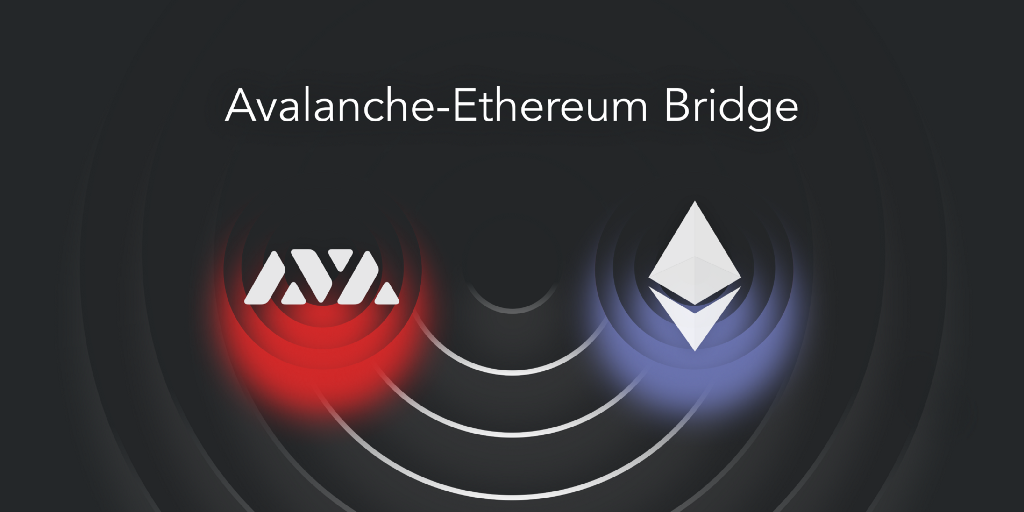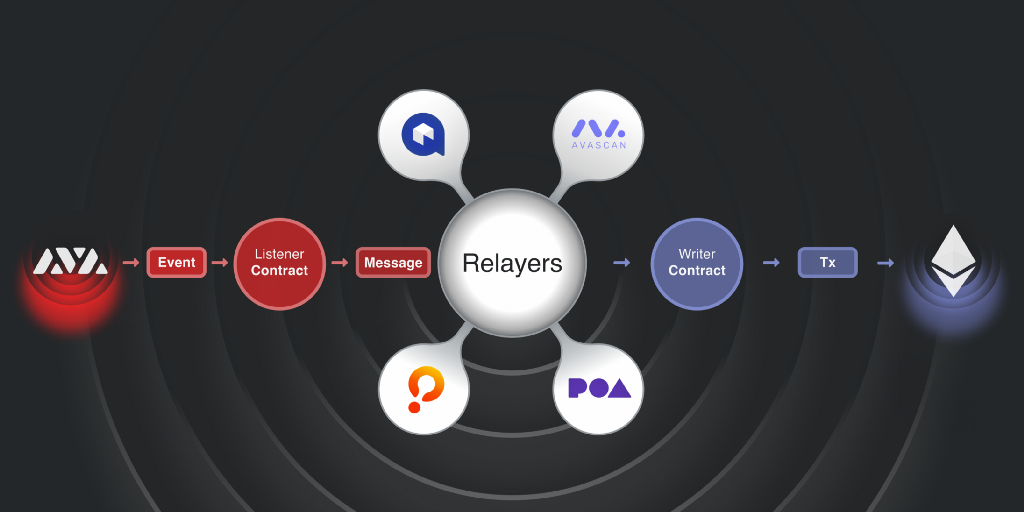The Avalanche-Ethereum Bridge: What You Need to Know
Using ChainSafe’s ChainBridge, trusted relayers Protofire, Hashquark, POA Network, and Avascan will enable two-way transfers between Avalanche and Ethereum.

Liquidity begets liquidity. Over the last few quarters, our team developed multiple initiatives to not only optimize the experience for developers building decentralized applications but also to forge connections between established sources of crypto liquidity.
We started with mainnet launch this past September, alongside tightly-coordinated partnerships with leading global exchanges like Binance, Bitfinex, and FTX. Meanwhile, we continued to run full speed ahead on developing core capabilities, ecosystem partners, and innovations only possible with Avalanche’s technology.
Many of these initiatives will go-live in the coming months, but today, we’re excited to announce Avalanche’s first cross-chain Ethereum bridge. The Avalanche-Ethereum bridge, developed by ChainSafe through the Avalanche-X grants program, is in the final phase of testing before deploying to mainnet and opening the gates for simple, secure transfer of assets between Avalanche and Ethereum.
The Avalanche-Ethereum Bridge, using ChainBridge*, is a two-way token bridge that enables seamless ERC-20 and ERC-721 transfers between Avalanche (via the C-Chain) and Ethereum. If you want to use ETH within decentralized applications on Avalanche, you will be able to lock WETH (wrapped ETH) in the ChainBridge contract, and an equivalent token on Avalanche will be minted. The Bridge can be used either by interacting with apps that integrate the Bridge or with an Avalanche-Ethereum asset swap app (coming soon).
The testnet implementation of the Bridge will be secured by our partners Protofire, Hashquark, POA Network, and Avascan. Relayers will approve and reject transfers based on a vote made by all relayers. If the vote passes a certain threshold, the token transfer is approved.
*ChainBridge’s contracts have been audited by ConsenSys Diligence.
Under the Hood

For those interested in a more technical explanation of the bridge, we’ll explain step-by-step what’s going on under the hood. Let’s use an example of how tokens can be transferred from Ethereum to Avalanche. Users of the bridge will only have to send, at most, two transactions to transfer assets from one blockchain to another.
- Approve the Bridge contract for spending the token on Ethereum (using the “approve” method)
- Deposit and lock the approved token to the Bridge contract (using the “transferFrom” method)
- A successful deposit will emit the deposit event to relayers (Protofire, Hashquark, POA Network, Avascan)
- A proposal is created on the Bridge contract on Avalanche; proposals have different statuses: inactive, active, finalized, and transferred. New proposals are marked as active and contain a hash of the transfer data, preventing the deposit data from appearing on Avalanche before being approved.
- Other relayers will look at the hash and compare it against Avalanche’s data from Ethereum’s data and vote on the accuracy of the supplied data.
- If the vote is approved, the token is minted on Avalanche (using the “executeDeposit” method)
Run your own Avalanche-Ethereum Bridge
In the spirit of open-source, we are releasing the Avalanche-Ethereum Bridge codebase for the wider Avalanche and Ethereum community to run themselves. All you will need to do is deploy the contracts, run the relayers, and configure them with the deployed contracts.
We don’t believe in a “one chain wins all” future. We believe that there will be many chains providing specified value to users and applications worldwide. Avalanche is focused on delivering sub-second finality, Visa-level throughput, and flexibility for developers to build without limits, without sacrificing decentralization (currently standing at over 600 validators globally).
Users benefit from choice. With more bridges, the user-experience will naturally improve as different innovations and features are introduced on prior iterations of bridges, to their benefit. This bridge marks the beginning of a whole new suite of solutions seeking fast, scalable blockchain solutions like Avalanche.
The Calm Before The Storm
Over the next few months, we’ll be releasing a whole slew of new assets, applications, and tools on Avalanche. Many of these solutions you may already be familiar with, while others are completely new to the blockchain industry. We can’t wait to share with you what we’ve been planning. If you have an idea you want to see on Avalanche, join us on Discord and discuss with the team!
https://medium.com/media/b8a596544f943e3618682869c7e2f97a/href
About Avalanche
Avalanche is an open-source platform for launching decentralized finance applications and enterprise blockchain deployments in one interoperable, highly scalable ecosystem. Developers who build on Avalanche can easily create powerful, reliable, and secure applications and custom blockchain networks with complex rulesets or build on existing private or public subnets.
Website | Whitepapers | Twitter | Discord | GitHub | Documentation | Forum | Avalanche-X | Telegram | Facebook | LinkedIn | Reddit | YouTube
![]()
The Avalanche-Ethereum Bridge: What You Need to Know was originally published in Ava Labs on Medium, where people are continuing the conversation by highlighting and responding to this story.


